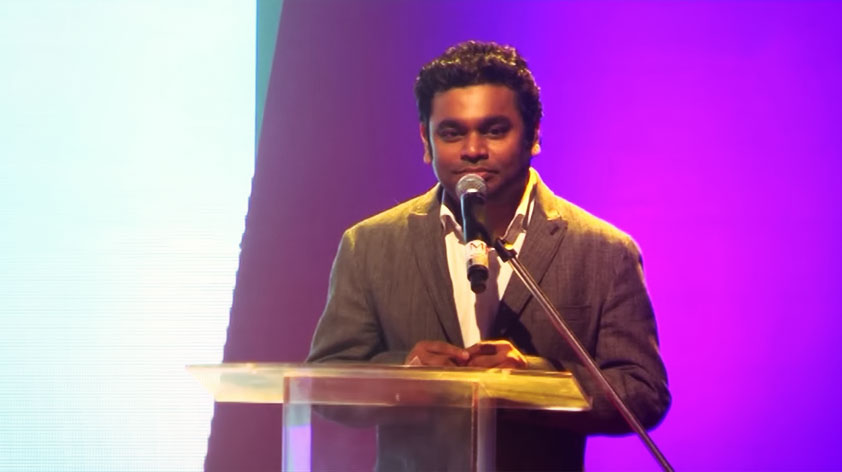
Octogenarian music historian Raju Bharatan says if composer Naushad was king-emperor in the era spanning the 1940s-1970s, Grammy award-winner AR Rahman is the last evidence of the composer being king in Indian cinema.
Bharatan has documented Naushad’s tone-setting career as composer from the 1940s to 2005 in his latest book: “Naushadnama: The Life and Music of Naushad”.
“If Naushad was king-emperor in his time, AR Rahman is the last evidence of a composer (with no true comprehension of Urdu) being king in Hindustani cinema. What we hear today, in the name of music, is diabolically deadly murder of poetry in all its subtleties,” Bharatan told sources in an email interview.
“That Naushad lived to witness this assault on our senses was the saddest part of it all.”
Bharatan has had a successful career juggling films and cricket. He started out — end-1952 — on the editorial desk of “The Illustrated Weekly of India” in the Times Group, serving for a full 40 years. Initially, he was assigned the then contemptuously viewed sports and film pages to do.
When Khushwant Singh materialised as editor of ‘The Weekly’ in June 1969, he took pride in projecting Bharatan as his specialist on cricket and films alike.
“I rose to my zenith under the Sardar whom cartoonist Mario alone could contain inside a highly charged electric bulb,” said Bharatan, who at Khushwant’s instance did the “Forty Years of Naushad” story in “The Weekly” in mid-70s.
Asked if music composers still compose six tunes for one song — as was done in Naushad’s times — Bharatan said, “There is no question any longer, of preparing six tunes for one song situation, as there now is no true application of mind to creating a genuine song situation. Raj Kapoor, for instance, evolved the script strictly in musical terms. Even as the film’s photoplay took shape in his mind and heart, the songs would, eminently naturally, emerge as ‘idea-tunes’ situationally integrating into the screenplay.”
Bharatan recalled that Raj Kapoor knew exactly what he wanted audiovisually. “As Shanker (of the Shanker-Jaikishan team) started playing his six tunes for Raj Kapoor, if the very first blend appealed to him, Kapoor (as ‘Shree 420?) decided on the dot: ‘That’s it!’ After that he would not stop to hear the remaining five tunes.”
He points out that composer RD Burman (Pancham) was mortally scared when he heard that, in “Dharam Karam” (1975), he had to get the sole song, going upon Raj Kapoor, okayed by that perfectionist himself. “Pancham told ‘Dharam Karam’ maker-director Randhir Kapoor that he no longer wanted to do the film, arguing: ‘You never told me that I would have to get a tune ‘passed’ by Raj Saab! I want no more of it. I well remember how Guru Dutt drove me up the wall in the case of the never completed ‘Raaz’!”
“If Pancham finally sat down to compose six tunes, it was only after no end of persuasion. Yet the first tune that Pancham played, Raj okayed on the spot, noting: ‘Hit gaana hai, bottle kholo!’ Only after that, imagine, did lyricist Majrooh Sultanpuri come in to give ‘Eik din bik jaayega maati ke mol’ expression to the Pancham tune.”
Not surprisingly Bharatan has no favourites from the new songs being churned out, averring, “Do you really expect someone of the Naushadian generation to ‘lungi-dance’ to tune? Minus poetry, what is music?”
Bharatan said that after the Urdu-clueless way in which Rahman composed for “Jodha Akbar”, he expected nothing musically elevating any more.
“At least there was a spark of creativity in AR Rahman. Even that spark is being speedily extinguished by the music that you get to hear today. Oh for a Naushad settling for nothing less — from Shakeel Badayuni – than ‘Badi chot khaayi jawaani pe roye’ – seeing that the composition had to communicate the picture of ‘Anarkali’ Madhubala in chains. Chainpulling ‘Chennai Express’ music is what we get, by contrast, today. Songs totally banishing the element of fantasy going with cinema as an art pursuit.”
Bharatan preferred to stay vintage even while observing, “Love Mohammed Rafi, by all means, but without ever being totally dismissive of Kishore Kumar. If you tune with C Ramchandra as a ground-breaker, how, possibly, could you question RD Burman?”
According to him, after Partition of India, Sahir Ludhianvi and Majrooh Sultanpuri were the best poets in films. He recalled how Majrooh keenly resented the focus being on Sahir.
“You people write only about Sahir!” Bharatan quoted Majrooh as saying.
But it is Shailendra for whom Bharatan reserved the number one spot. As he put it, “Shailendra excelled them all in terms of bringing, to songwriting, a rare lucidity to match a rare profundity. Shailendra rates a notch higher because, nine times out of ten, he ‘wrote to tune’ and yet maintained the highest standards in his versifying.”
Bharatan says he was not the only one who thought Shailendra was the best. When he took the point to SD Burman, inviting him to choose the one whom he rated as the finest poet, ‘SD’ picked Shailendra upon being urged, “Forget your ego clashes with Sahir and let us have your unbiased choice.”
Dada Burman, in zeroing in upon Shailendra, underscored: “I had only to send him to the terrace of my ‘The Jet’ bungalow in Khar, bottle in hand, and, almost predictably, something that I could meaningfully tune — for ‘Guide’ — like ‘Din dhal jaaye haay raat na jaaye’, would turn up.”
“Burman and Naushad were good friends. I bring to writing ‘Naushadnama’ the same level of commitment that Naushad brought to scoring music,” Bharatan said.
(PTI)

